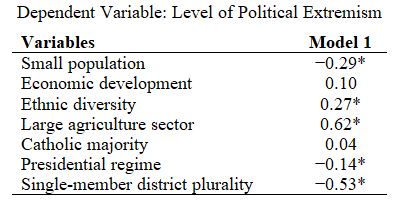Brazil is a large, ethnically heterogeneous, primarily Catholic country. It has a presidential system with proportional representation electoral laws. Based on this description and the hypothetical regression results below, what factors about Brazil encourage political extremism? What factors discourage political extremism? Which have no effect?

What will be an ideal response?
• Variables relevant to Brazil that encourage extremism: Having a large population (instead of a small one), ethnic heterogeneity, and proportional representation electoral rules (instead of SMPD).
• Variables relevant to Brazil that discourage extremism: Presidential regime.
• Variables relevant to Brazil that have no effect on extremism: Catholic majority.
• Variables that have significant coefficients but that are not mentioned in the information about Brazil given in the question: Economic development, having a large agriculture sector.
You might also like to view...
Random assignment of participants to groups helps reduce
A) attrition. B) regression to the mean. C) threats to internal validity from attrition and regression to the mean. D) threats to construct validity.
The only major statewide executive officer the governor of Texas appoints is the lieutenant governor
Indicate whether this statement is true or false.
Under the Fifteenth Amendment, what was a legal basis for denying someone the right to vote?
a. Race b. Color c. Having been a slave d. Gender
Answer the following statements true (T) or false (F)
1. California has fifty-eight counties, with Los Angeles having the highest population. 2. San Francisco is the only combined city-county in the state. 3. Education districts have separately elected board members who are not also on the City Council. 4. The Bay Area Rapid Transit (BART) is considered a special district. 5. Water districts are examples of single-issue regional agencies.